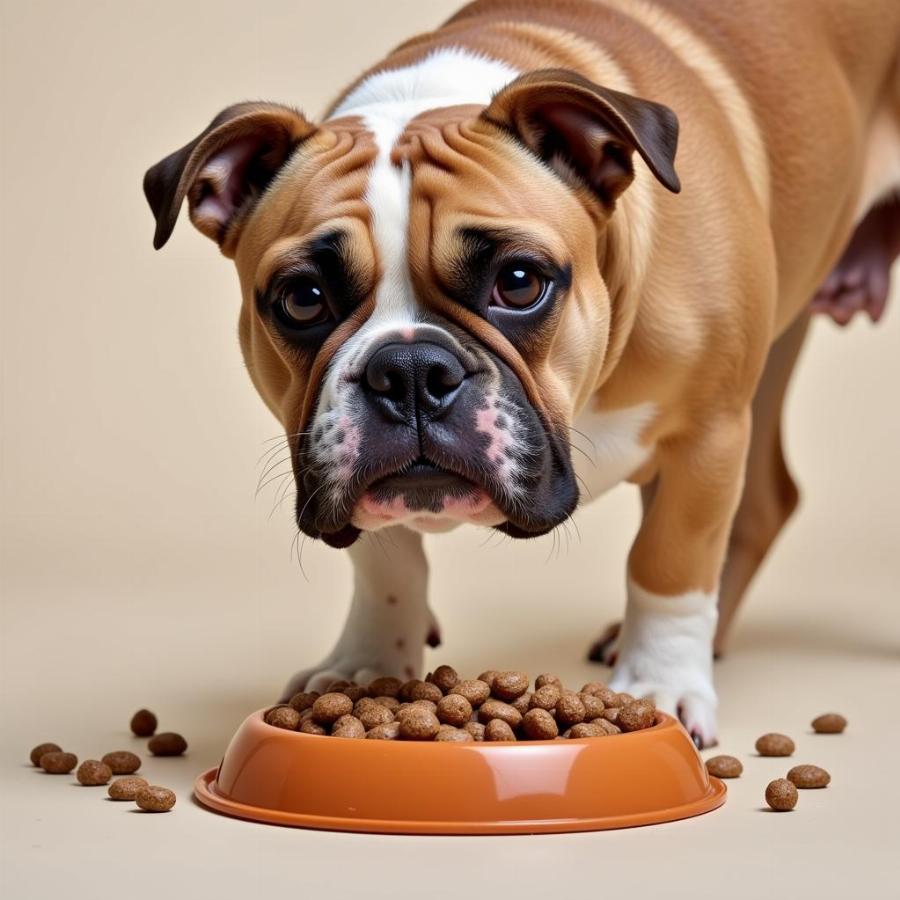Finding the right dog food for your Bulldog can be a challenge. With their unique needs and potential health sensitivities, choosing the best kibble is crucial for their overall well-being. This article will guide you through everything you need to know about selecting the recommended dog food for Bulldogs, ensuring your furry friend gets the optimal nutrition they deserve.
Understanding Your Bulldog’s Dietary Needs
Bulldogs are brachycephalic breeds, meaning they have short noses and flat faces. This can lead to breathing difficulties and impact their eating habits. They also have sensitive stomachs and are prone to allergies, making choosing the right dog food even more important. A balanced diet for a Bulldog should be rich in high-quality protein for muscle development, moderate in healthy fats for energy and skin health, and include essential vitamins and minerals for overall wellness. Look for dog foods specifically formulated for Bulldogs or those designed for sensitive stomachs.
 Choosing the right food for your Bulldog
Choosing the right food for your Bulldog
Key Nutritional Considerations for Bulldog Food
What should you be looking for in recommended dog food for Bulldogs? Here are some crucial factors:
- High-Quality Protein: Look for meat-based protein sources like chicken, beef, lamb, or fish as the primary ingredients. This supports muscle growth and maintenance.
- Moderate Fat Content: Healthy fats from sources like fish oil or flaxseed oil contribute to skin and coat health, as well as providing energy. Avoid excessive fat, which can contribute to weight gain.
- Fiber for Digestion: Fiber promotes healthy digestion and can help prevent constipation, a common issue in Bulldogs.
- Limited Ingredients: Choose foods with limited ingredients, especially if your Bulldog has allergies. This makes it easier to identify potential allergens.
- Joint Support: Bulldogs are prone to hip and joint issues. Look for food containing glucosamine and chondroitin to support joint health.
What Dog Food is Recommended for Bulldogs with Allergies?
If your Bulldog suffers from allergies, opt for hypoallergenic or limited ingredient diets. These foods typically contain a single protein source and easily digestible carbohydrates, minimizing the risk of allergic reactions. Consult your veterinarian for specific recommendations tailored to your Bulldog’s individual needs.
What Dog Food is Recommended for English Bulldogs?
While the general guidelines apply to all Bulldogs, English Bulldogs can be particularly prone to breathing issues and skin allergies. Prioritize recommended dog food for english bulldogs with smaller kibble size to facilitate easy chewing and swallowing. Also, consider french bulldog dog food which often caters to similar sensitivities.
Feeding Your Bulldog: Tips and Tricks
- Portion Control: Avoid overfeeding, as Bulldogs are prone to weight gain. Follow the feeding guidelines on the dog food package and adjust based on your dog’s activity level and weight.
- Elevated Food Bowls: Using elevated food bowls can help brachycephalic breeds eat more comfortably.
- Slow Feeders: If your Bulldog eats too quickly, a slow feeder bowl can help prevent choking and encourage slower, more mindful eating.
Conclusion
Choosing the right recommended dog food for Bulldogs is vital for their health and happiness. By understanding their specific dietary needs and following the guidelines outlined in this article, you can ensure your Bulldog thrives on a nutritious and balanced diet. Remember to consult with your veterinarian for personalized recommendations, especially if your Bulldog has any existing health conditions.
FAQ
- Can Bulldogs eat human food? While some human foods are safe for Bulldogs in moderation, many are toxic. Stick to a balanced dog food diet and consult your veterinarian before introducing any human food.
- How often should I feed my Bulldog? Most adult Bulldogs thrive on two meals a day.
- What are the signs of food allergies in Bulldogs? Common signs include skin itching, ear infections, and gastrointestinal upset.
- What should I do if my Bulldog refuses to eat its food? Try switching to a different flavor or brand, or consult your veterinarian to rule out any underlying medical conditions. why is my dogs tongue white
- Can I give my Bulldog supplements? Discuss any supplements with your veterinarian before adding them to your Bulldog’s diet. what to do for dogs with dry skin
- My Bulldog has a sensitive stomach. What type of food should I choose? Look for foods formulated for sensitive stomachs or limited ingredient diets. soft palate surgery dog
- How can I tell if my Bulldog’s food is causing allergies? Elimination diets, guided by your veterinarian, are the most effective way to pinpoint food allergies.